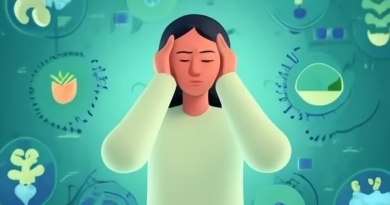The Link Between Nutrition and Mental Health: What You Eat Affects How You Feel

We often think of nutrition as something that affects only our physical health—our weight, energy levels, and fitness. But what you eat also plays a powerful role in your mental well-being. Research increasingly shows that a balanced, nutrient-rich diet can reduce symptoms of anxiety and depression, improve focus, and stabilize your mood.
In this article, we’ll explore how nutrition influences mental health—and how to build a brain-boosting, mood-supporting way of eating.
How Food Affects the Brain
Your brain is always working—even when you’re asleep. To function at its best, it needs a steady supply of quality fuel. That fuel comes from what you eat. If your diet lacks essential nutrients, or if it’s full of processed and sugary foods, your mental performance and emotional balance may suffer.
Key areas impacted by nutrition:
- Mood regulation
- Memory and concentration
- Stress resilience
- Sleep quality
1. Focus on Nutrient-Dense Foods
Nutrient-dense foods provide the vitamins and minerals your brain needs to function properly. These nutrients help with neurotransmitter production—like serotonin and dopamine—which play a key role in your mood.
Brain-supportive nutrients:
- Omega-3 fatty acids – found in salmon, walnuts, flaxseeds
- B vitamins – found in leafy greens, eggs, legumes
- Magnesium – found in dark chocolate, nuts, seeds, whole grains
- Zinc – found in pumpkin seeds, chickpeas, beef
- Iron – found in spinach, lentils, lean meats
- Vitamin D – from sunlight and fortified foods (or supplements)
2. Prioritize Gut Health
Did you know your gut is sometimes referred to as your “second brain”? That’s because it produces about 90% of your body’s serotonin, a neurotransmitter that affects mood, sleep, and digestion.
To support a healthy gut:
- Eat fermented foods like yogurt, kefir, sauerkraut, and kimchi
- Add prebiotic fiber (bananas, garlic, oats, onions)
- Reduce processed foods and excess sugar
- Stay hydrated
A healthy gut can lead to a happier, more balanced mind.
3. Avoid Blood Sugar Spikes and Crashes
Highly processed foods and sugar-heavy meals cause your blood sugar to spike and crash. This can lead to irritability, anxiety, brain fog, and fatigue.
Tips to stabilize blood sugar:
- Combine carbs with protein and healthy fats
- Choose whole grains over refined grains
- Avoid skipping meals, especially breakfast
- Snack on nuts, fruits, or veggies if needed
Balanced blood sugar = balanced mood and energy.
4. Limit Caffeine and Alcohol
While coffee and alcohol may seem like mood boosters in the short term, too much of either can negatively impact sleep, anxiety levels, and overall mental clarity.
Tips:
- Limit caffeine after 2 p.m. to protect sleep
- Keep alcohol consumption moderate or occasional
- Swap in calming herbal teas like chamomile or peppermint
5. Stay Hydrated
Even mild dehydration can affect your mood, focus, and energy. Water is essential for brain function and overall mental clarity.
Aim for:
- About 8 cups (2 liters) of water per day, more if you’re active
- Herbal teas, infused waters, or broths as hydrating alternatives
Tip: Carry a reusable water bottle to make hydration a habit.
Sample Mental Health-Supporting Daily Meal Plan
Breakfast:
- Oatmeal topped with chia seeds, blueberries, and almond butter
Lunch:
- Grilled salmon salad with leafy greens, avocado, olive oil, and quinoa
Snack:
- Handful of walnuts and a piece of dark chocolate
Dinner:
- Stir-fried vegetables with tofu, brown rice, and a side of miso soup
Evening:
- Chamomile tea and a banana with almond butter
Final Thoughts: Eat to Support Your Mind
The connection between food and mood is real. By choosing whole, nourishing foods and minimizing processed ingredients, you can support not only your body—but your brain and emotional well-being too. You don’t need to follow a perfect diet—just aim for more balance, variety, and mindfulness in what you eat.
Because when you eat well, you feel well.



